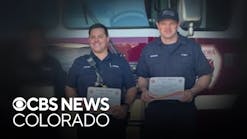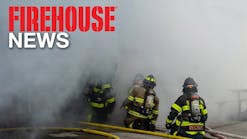Like many towns, Mason City's 1,000 residents rely on a volunteer fire department. Big fires might prompt a call for assistance from neighboring volunteer districts.
But when a blaze rages with fury, the station blasts the aged whistle. Retired firefighters drop everything and hustle out to lend a hand.
"In a small community, you gotta do what you gotta do," says Kevin Meyer, volunteer fire chief in Mason City, 35 miles south of Peoria in the middle of crop fields.
A wild one broke out last week at the Mason City Hotel. The manager, who uses oxygen, was smoking. She dropped her cigarette and sparked a chair afire. The rushing oxygen fanned the flames.
The 50-year-old ranch motel went up fast. Its 25 residents, including some living in converted apartments, scrambled for safety. An emergency call zapped into the fire station.
Fire calls are automatically relayed by pagers to the department's 26 firefighters. However, most were out of town at their day jobs. Only 12 responded to the station.
"However many guys we get, we get," says Chief Meyer, who works across the street from the motel at Illini Central Grade School, where he is head of maintenance.
Noting the low manpower at the motel fire, Meyer called for help from the volunteer department in Easton, 10 miles away.
"The small communities - Easton, us, San Jose - we depend on each other," says Meyer, a lifelong resident of Mason City.
At the scene, he found two unexpected helpers: a volunteer firefighter from New Holland who happened to be in town and a volunteer firefighter from Greenview who'd heard the call on his scanner and sped to the scene.
But even under a shower of water, the fire stayed strong. The crew needed help, so Chief Meyer put out the call.
Behind the station stands a phone pole topped with an aged, yellow horn - known locally as the fire whistle. Before pagers came along in the '80s, the whistle would summon firefighters.
The whistle stays silent but maybe once or so a year. When it blares - sort of like a tornado siren - the town knows there's a hot one. In a flash, retired firefighters pitch in.
"I jumped in my truck and took off," says Bob Griffin, 58, a district manager at the National By-products rendering plant, just south of town.
Griffin, who served on the force from 1972 to 1992, arrived at the motel with five other retired volunteers, who ranged in age from late 40s to late 50s. Griffin drove a tanker truck back and forth to the motel. Other retirees helped out in other backup roles, such as driving their pickup trucks to shuttle air tanks back to the station for refilling.
Griffin and the others fought the blaze for several hours. The fire leveled the motel, but all residents got out alive.
Chief Meyer, 46, says he's always trying to recruit 20-something firefighters. But with few businesses in town, the department rarely sees new prospects.
So, Mason City will continue to depend on help from Griffin and other retired volunteers.
Griffin is approaching 60, an age where most retired firefighters stay retired. But Griffin says he'll keep his ear tilted toward the station: He'll show up to fires "as long as they keep blowing the whistle."





